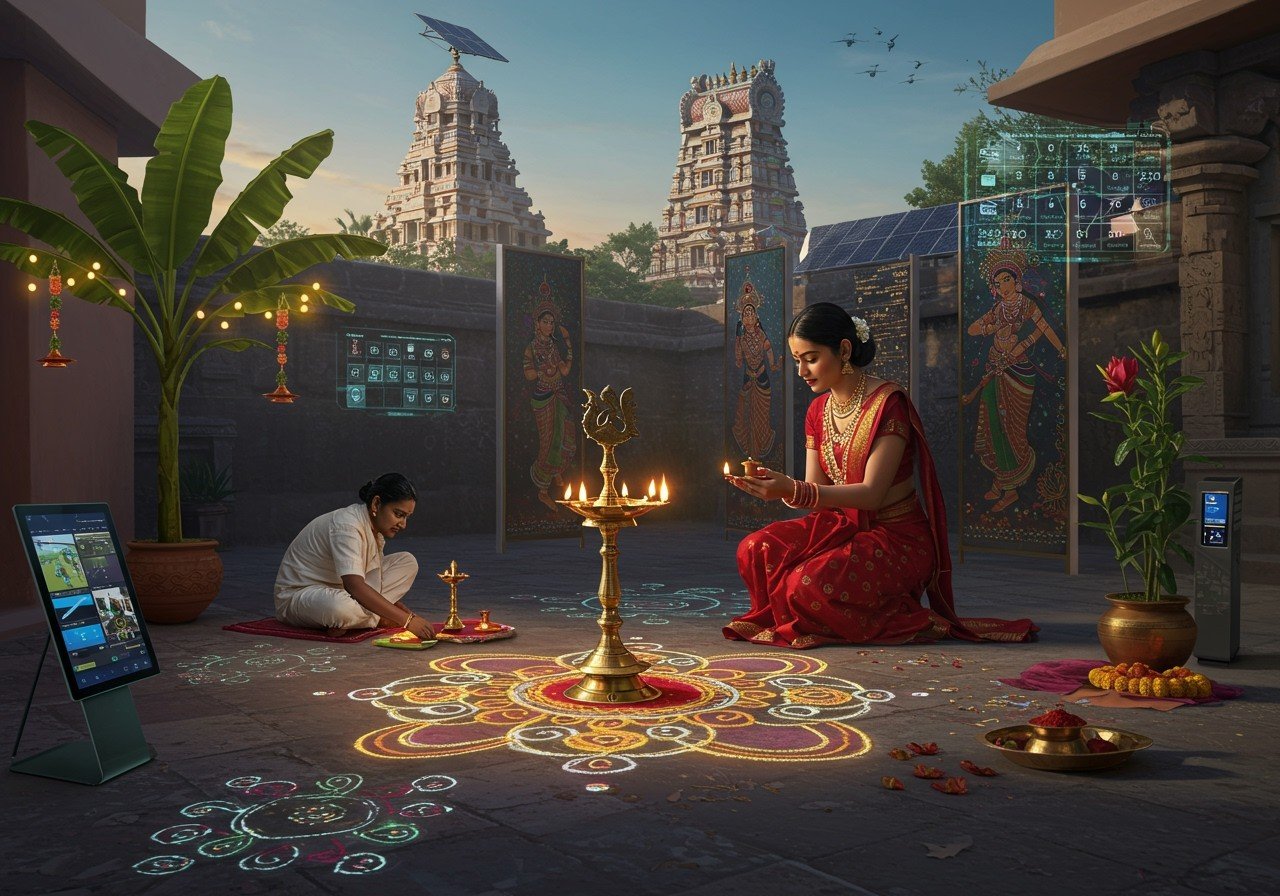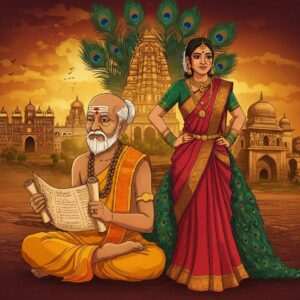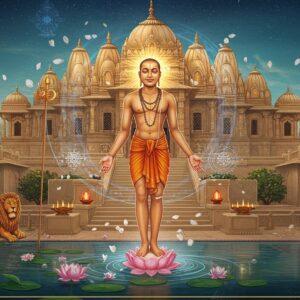
South India, a land of vibrant cultures, encompasses Kerala, Karnataka, Tamil Nadu, Andhra Pradesh, and Telangana. Each state contributes to a rich tapestry of customs and traditions, deeply rooted in history and spirituality. In today’s fast-paced world, online platforms like poojn.in provide convenient access to authentic ritual items, ensuring these traditions thrive. Let’s delve into the heart of South Indian culture:
The Significance of Temple Architecture
South Indian temples are renowned for their intricate architecture, serving as a testament to the region’s rich spiritual heritage. The Dravidian style, prominent in Tamil Nadu, is characterized by towering gopurams (gateways) adorned with elaborate carvings, depicting stories from epics and scriptures. These temples embody cosmic order and religious beliefs through elements like mandapas (pillared halls) and vimanas (towering structures above the sanctum). The Brihadeeswarar Temple in Thanjavur, a UNESCO World Heritage site, stands as a magnificent example of this architectural prowess. Temples are not merely places of worship; they are vibrant centers of cultural life, hosting festivals, community events, and artistic performances.
Want to learn more about the sacred spaces of South India? Dive into our blog post on South Indian Temple Architecture.
Religion and Spirituality: The Essence of South Indian Life
Spirituality is intricately woven into the daily lives of South Indians. Hinduism is the dominant religion, with Shaivism (devotion to Lord Shiva) and Vaishnavism (devotion to Lord Vishnu) being prominent branches. Temples are the heart of spiritual expression, showcasing stunning Dravidian and Vesara architecture. Each family often has a cherished kuladevata (family deity), honored through special ceremonies and pujas (ritualistic worship). While Hinduism is prevalent, other religions like Buddhism, Jainism, Christianity, and Islam also flourish, reflecting the region’s diverse tapestry of beliefs.
Festivals: A Celebration of Life’s Rhythms
Festivals in South India are a kaleidoscope of color, music, and joy. Pongal in Tamil Nadu is a harvest festival, a time to give thanks for nature’s bounty. Onam in Kerala celebrates the mythical homecoming of King Mahabali, marked by intricate floral decorations and grand feasts. Ugadi heralds the New Year for Telugu and Kannada communities, symbolizing new beginnings. Makar Sankranti welcomes the sun’s northward journey, signifying hope and prosperity. Each state has its unique celebrations of Navaratri and Dussehra, filling the streets with vibrant processions and traditional dances. Karthigai Deepam illuminates Tamil Nadu with rows of lamps, while Kerala’s Thrissur Pooram is a spectacular display of decorated elephants and traditional percussion. Karnataka’s Hampi Festival showcases the region’s rich cultural heritage, and the Fire Walk Festival is a testament to faith and devotion.
Delve deeper into the vibrant celebrations of the Kurmanathaswamy Temple with our comprehensive guide.
Arts and Entertainment: Expressions of the Soul
South Indian arts are an exquisite tapestry of emotion, storytelling, and artistic expression. Classical dance forms like Bharatanatyam, known for its grace and intricate footwork, and Kathakali, a theatrical art form with elaborate makeup and costumes, captivate audiences with their beauty and power. Kuchipudi from Andhra Pradesh seamlessly blends dance and drama, while Mohiniyattam from Kerala is a graceful and feminine dance form that embodies elegance. Yakshagana, a folk theater form from Karnataka, brings ancient epics and stories to life.
Carnatic music, the classical music of South India, is deeply devotional and complex, often performed in concerts known as kutcheris. Other significant art forms like Koodiyattam, Theyyam, and Oppana further enrich the cultural landscape.
Culinary Delights: A Symphony of Flavors
South Indian cuisine is a celebration of flavors, textures, and aromas. Rice is the staple food, accompanied by a medley of dishes. Idli, dosa, sambhar, and uttapam are beloved breakfast staples. Coconut is a key ingredient, adding richness and depth to dishes, especially in Kerala’s Malabar cuisine. Andhra Pradesh is known for its fiery curries, while Tamil Nadu boasts a variety of flavorful vegetarian and non-vegetarian dishes. Traditionally, food is served on a banana leaf, a practice that connects one to nature and adds a unique touch to the dining experience. And let’s not forget the aromatic filter coffee, a cherished tradition in the coffee-growing regions of Kerala, Karnataka, and Tamil Nadu.
Looking for authentic clay serving dishes for your South Indian meals? Explore our collection of bamboo kulos and clay ghats.
Traditional Attire: Elegance and Grace
Traditional clothing reflects the cultural identity of South India. Women gracefully drape themselves in vibrant sarees, each region boasting unique styles and weaves. Men traditionally wear the dhoti or lungi, simple yet elegant garments that have stood the test of time. These traditional attires are not just clothing; they are symbols of cultural pride and heritage.
At poojn.in, we offer a wide selection of traditional dhotis perfect for any occasion. Shop now and experience the comfort and elegance of pure cotton dhotis.
Social Customs: Bonds of Respect and Community
Social customs in South India emphasize respect, especially for elders, and strong community bonds. A warm “Namaste” is the customary greeting, a gesture of respect and acknowledgement. Weddings are vibrant affairs, filled with rituals and celebrations that vary across communities. Key rituals include Panda Kaal Muhurtham (invoking ancestral blessings), Kanyadaan (giving away the bride), and Saptapadi (seven sacred steps taken together by the couple). The tradition of eating with hands is a deeply ingrained practice, fostering a direct connection with the food and its blessings.
Cultural Values: The Foundation of South Indian Society
Respect for elders is a cornerstone of South Indian culture, fostering a sense of continuity and wisdom passed down through generations. Strong family and community ties create a supportive network, where individuals are deeply connected to their roots. Spirituality permeates everyday life, guiding values and shaping a harmonious way of living. These values are not just traditions; they are the bedrock of South Indian society.
Poojn.in: Your Partner in Preserving South Indian Traditions
At poojn.in, we understand the importance of preserving cultural heritage. We offer a wide range of authentic puja items, delivered right to your doorstep, making it convenient for you to observe your traditions with reverence and ease. From complete puja sets for special occasions like Grihapravesham and Seemantham to essential items like brass lamps, copper vessels, and fresh puja flowers, we have everything you need. Explore our specialized regional products, including Kerala-style nilavilakku, Tamil Nadu temple lamps, and Karnataka-style puja plates. We ensure temple-grade quality and authentic materials, packaged with care for safe delivery. Our expert guidance is available to help you select the perfect items for your needs. Browse our collection online at www.poojn.in or connect with us via call or WhatsApp for personalized assistance.
Illuminate your puja space with the warm glow of traditional clay diyas. Shop our collection and bring a touch of tradition to your home.
Embracing the Legacy: South Indian Traditions in 2025 and Beyond
South Indian traditions are a precious legacy, passed down through generations, connecting us to our roots and enriching our lives. In this digital age, platforms like poojn.in empower us to preserve and celebrate these traditions with greater accessibility and convenience. As we embrace modern life, let us continue to cherish and uphold the values, rituals, and customs that make South Indian culture so vibrant and unique. We invite you to explore the beauty of these traditions and pass on this rich heritage to future generations.
FAQs: Your Guide to South Indian Rituals and Traditions
Temple architecture in South India holds deep significance, reflecting cultural nuances and spiritual symbolism. Each temple element carries meaning, representing different aspects of life and the universe, much like the body of a deity. Festivals are integral to South Indian culture, bringing communities together to honor deities and celebrate life’s cycles. These occasions are filled with music, dance, and rituals, preserving cultural heritage and reinforcing social bonds. Traditional beliefs are the heart of South Indian rituals, connecting individuals to their ancestry and providing a moral compass. These beliefs provide a sense of belonging and a framework for harmonious living.
The Varadharaja Perumal Temple is known for its grand celebrations of festivals like Vaikunta Ekadasi, Panguni Uthiram, and Brahmotsavam, each with unique rituals and significance. These festivals draw devotees from far and wide, fostering a sense of community and shared devotion. South Indian rituals encompass a variety of traditional practices, such as offering flowers, lighting lamps, and chanting mantras. These practices are performed with reverence and devotion, seeking blessings and expressing gratitude. Temple architecture continues to evolve, incorporating modern materials while maintaining traditional aesthetics. This blend ensures durability while preserving the awe-inspiring beauty that has captivated generations.


